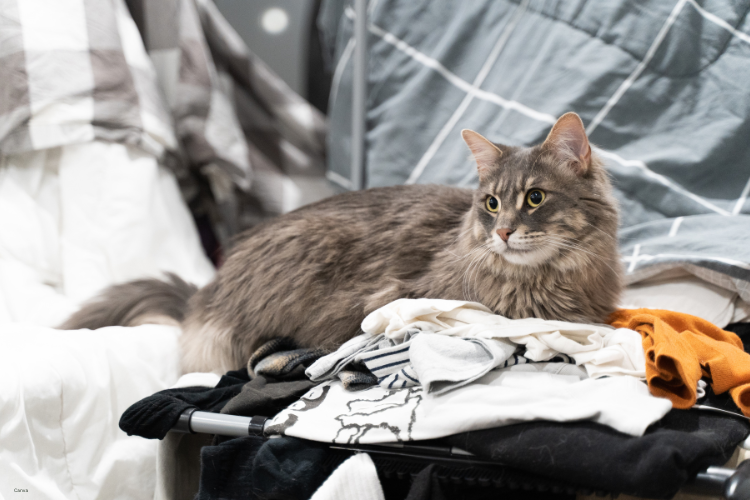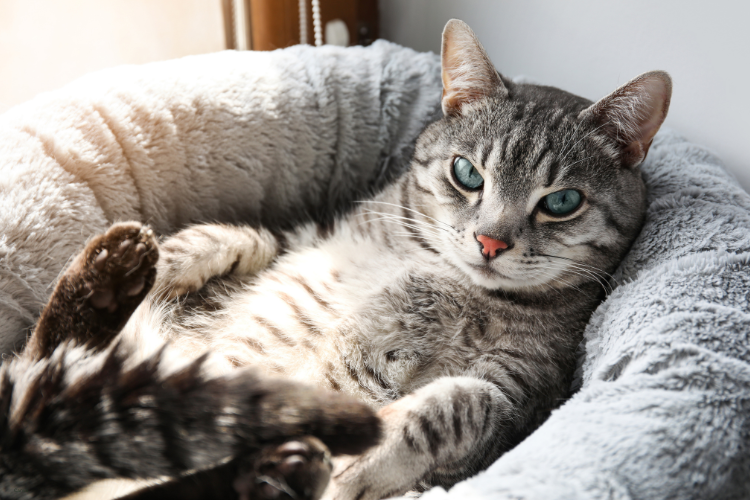Some cats throw silent tantrums that hit harder than a hiss ever could.

Cats might not shout when they’re jealous, but they know how to make their point. They’re subtle, strategic, and honestly kind of savage about it. You’ll think everything’s fine until you catch a look, a movement, or a deliberate act of petty sabotage. That’s how they operate. They keep it quiet but emotionally chaotic. If a cat feels replaced, ignored, or mildly snubbed, they won’t yell. They’ll let their silence speak volumes.
1. They pull the slow blink and hold it just long enough to guilt trip you.

There’s nothing random about that dramatic slow blink. It’s not sleepiness. It’s communication. When a cat is jealous, they’ll sometimes exaggerate their slow blinks like they’re trying to shame you without blinking first, according to Sandra C. Mitchell, DVM, DABVP at PetMD. It’s not affection anymore. It’s a statement.
They’re not closing their eyes because they trust you. They’re doing it because they want you to notice them—and realize they’ve noticed you giving someone else attention. That deliberate little eye squint becomes a passive-aggressive power move.
2. They block you like they’re curating your social feed in real life.

You try to pet your dog, pick up a new baby, or talk to your partner. Suddenly your cat’s there. Sitting between you and the action. Not meowing. Not moving. Just physically placing themselves in your line of sight like a furry little force field.
It’s not coincidence. It’s a silent boundary. They’re not fighting. They’re asserting space. And they know it throws off the mood. That interruption is all about regaining control without a single sound, as reported by Adrienne Kruzer The Spruce Pets.
3. The slow tail flick becomes a whole silent monologue.

That twitching tail at the edge of your vision isn’t random, as stated by Karen B. London, PhD at Kinship. It’s a whole vibe. When your cat’s tail starts doing that slow, agitated flick while they stare at you across the room, you’re being judged. Hard. And they want you to know it.
It’s not just a mood indicator. It’s an expression of jealousy. They’re watching how long you’re spending with something else and broadcasting their annoyance in slow, deliberate movements. That tail is holding back emotions like a well-trained therapist. But it’s definitely saying things.
4. They suddenly sit on your stuff and stare at the wall like it wronged them.

You leave out a laptop, book, jacket, or literally anything you use often. It doesn’t matter what it is. If it smells like you or gets your attention, they’ll sit on it. Not sleep. Not curl up. Just sit there like a decorative threat and refuse to make eye contact.
It’s not comfort. It’s strategy. They know you’ll notice. That silent protest, complete with the deadpan wall stare, is a whole statement about being replaced. They’re not going to make a scene. They’re just going to take over your life one object at a time.
5. They act completely unbothered until you touch something else.

Jealous cats pretend not to care in the most obvious way possible. They’ll go still, look bored, or stretch dramatically while you’re interacting with someone else—especially another pet. It’s the performance of apathy, which is actually a red flag if you know how cats work.
That calm is not real. It’s calculated. The second you turn your attention back to them, they break the silence with a dramatic flop or a too-long stare. They weren’t napping. They were waiting. And now you’re on notice.
6. They avoid you just enough to make you spiral.

Instead of throwing a fit, some cats go emotionally icy. They disappear for a few hours. Ignore the sound of food being poured. Act like they didn’t hear you call them. It’s not distance. It’s punishment. Quiet punishment.
That temporary ghosting isn’t them being scared or busy. It’s a silent protest with a timer. Once they feel like you’ve been appropriately stressed about their absence, they’ll casually show up in the hallway, stretch like nothing happened, and resume their role as the center of your emotional ecosystem.
7. They break your routine just enough to remind you who’s in charge.

Cats know your patterns. They know when you wake up, where you walk, and what time you sit down. When they feel jealous, they disrupt that. A chair gets scratched. A plant gets knocked over. A familiar napping spot suddenly gets relocated to block your laptop or your favorite seat.
They don’t have to vocalize anything. They’re just showing you that they still control the vibe. It’s not revenge—it’s commentary. Quiet, well-timed, deeply inconvenient commentary. And they don’t even need to look at you while they do it.
